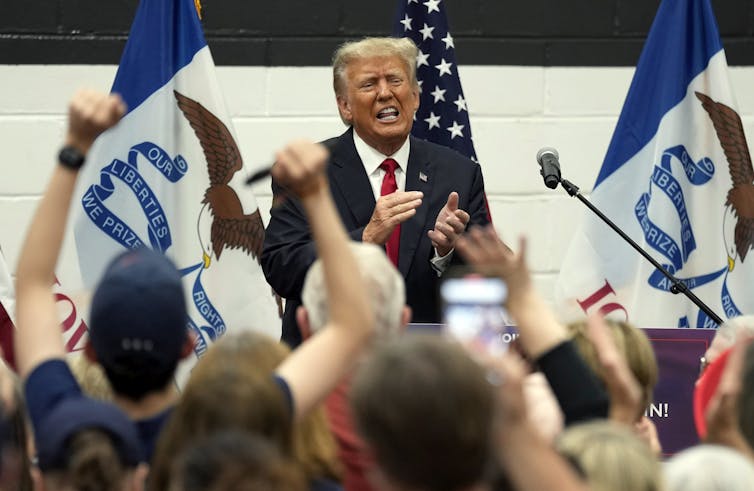
(AP Photo/Charlie Neibergall)
Jeff MacLeod, Mount Saint Vincent University
Donald Trump has reportedly been indicted on federal charges for his handling of classified documents after he lost the 2020 presidential election.
The indictment follows an investigation into his handling of top-secret documents after he vacated the Oval Office and allegations he obstructed the federal government’s efforts to retrieve them.
Nonetheless, Trump could still win the Republican Party’s nomination for president in 2024. Even under indictments federally and in the state of New York, his popularity among many Republicans and MAGA supporters remains undiminished. With that unwavering support, he may go on to become president of the United States again.
How?
Trump and his political team have created a political image based on a narrative that makes him difficult to beat. I call it the survivalist frame. It’s based in anger and fear, but offers a path to power for Americans who feel marginalized.
Trump has been cast in their minds as a hero, now unfairly persecuted by the criminal justice system, who knows the “truth.” They perceive a weakness in society and its inability to work for them.
‘Drain the swamp’
In 2016, Trump lumbered onto the stage sporting a red ballcap (an endearing symbol to the everyman), promising a new realm in which he and his supporters have agency, aided through the call and response of: “Drain the swamp” and “make America great again.”
His political image has been technically built through a camera lens and social media (Truth Social and before that, Twitter) but its primary force is a culture prepared to accept a revolutionary message.
No imagery can flourish without some fertile cultural soil, including an energized group ready to receive and shape it. Trump recognizes this narrative and is able to embrace it.
As American public policy professor David Gergen noted in 2016, Trump’s political success is based on his emotional appeal. “In politics,” Gergen wrote, “emotions count as much as math.”

(AP Photo/Matt York)
Marginalized people as heroes
In popular culture, the U.S. is brimming with similar narratives that cast the marginalized as heroes and public officials and institutions as corrupt and incompetent.
In this environment, activating a political frame may be more akin to the experience of a successful first date — an instinctual and immediate “love at first sight” gut reaction — rather than any rational measure of a political campaign.
A frame rests on the stories we relate to and gets pulled to the surface by words, pictures or sounds that remind us of them — a neurological reaction that is immediate and unconscious.
Trump knows when it comes to political appeal, emotions rule — and a politician’s frame has to be supported by a deeper cultural narrative.
Dominant movies, video games and graphic novels help build and sustain the survivalist narrative through powerful art.
Examples like The Walking Dead and Game of Thrones sustain this narrative, as they all feature protagonists who struggle against world-changing political upheaval and overcome it with a survivalist response. They challenge the environment, and counter with deadly violence fuelled by vengeance.
Even superheroes have moved from supporters of the government (the rule of law) to survivalists. One potent example is Frank Miller’s Batman that portrays the superhero as a brutal vigilante who openly challenges state authority and offers examples of victors’ justice through maiming and even murdering his opponents.
The anti-hero is also now the norm, rather than the exception, in popular comic books.
Government as the enemy
Art makes culture and culture often creates politics.
In both the artistic world and the real world, the survivalist narrative is robust but vague. Government is the enemy but it is cast in shadowy conspiracies with some kind of elusive evil working behind the scenes.
The frame has numerous entry points and can support the narratives of many people — they just need to feel like outsiders who think their abilities and values are underappreciated, combined with a view that the political system is seemingly unresponsive, corrupt and unwilling to protect them.
In this environment, the soil is ripe for a “strongman” leader to rise and to take power. Trump’s strongman/outsider stance makes sense in this world, and, for many in the Republican party, it is deeply desired.
Our imagination is complex and narratives intermingle with each other in numerous ways, a phenomenon that can’t be easily be captured through empirical methods. That’s why Trump’s support is often difficult to detect in traditional polling.
Trump wins in 2024?
The Trump team has carved out an aspect of the survivalist trope so adroitly that it led to unexpected political success in 2016, which can certainly can be transferred to 2024.
Why? Once a leader’s image has been enmeshed into a compelling narrative, they’re on the path to becoming a legend. And living legends are insulated from a certain amount of political criticism and difficult to defeat in an election.
If Trump’s political opponents don’t understand his cultural appeal, they won’t be able to counter it.
The former president’s artful presentation of his survivalist frame may propel him to a second term in the White House. Whether cast as a hero or villain, Trump has his own superpower.![]()
Jeff MacLeod, Professor, Political Studies/ Public Policy Studies, Mount Saint Vincent University
This article is republished from The Conversation under a Creative Commons license. Read the original article.
![]()